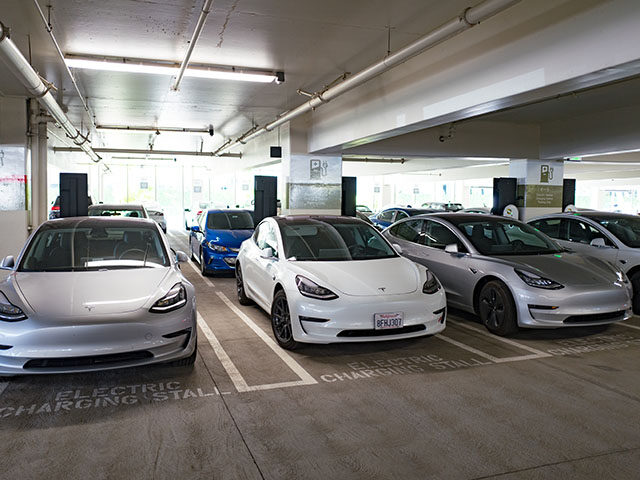A new car safety study has proven that electric vehicles (EVs) are too heavy to be restrained by guardrails that line roads in case of accidents, researchers at the University of Nebraska-Lincoln said.
As the amount of EVs such as Teslas and Chevrolet Bolts take over the roads amid concerns over the environmental impact of gasoline-powered vehicles, one of the lead researchers from the university’s Midwest Roadside Safety Facility (MwRSF) warned that there needs to be “some urgency to address this issue.”
In a study sponsored by the U.S. Army Engineer Research and Development Center (ERDC) and partnered with Auburn University’s Transportation Research Institute, MwRSF conducted a “first-of-its-kind crash test” of an EV pickup truck in October 2023.
The test used a 7,148-pound 2022 Rivian R1T truck that was sent at a barrier at a speed of 60 mph, with footage showing the heavy EV completely blasting through the guardrail and launching over the concrete wall while sending chunks of it flying:
The R1T’s immense weight is largely attributed to its 135-kWh battery pack, which brings the vehicle’s weight to a” ton more than a Ford F-150 SuperCab,” car review site Edmunds states.
“There is some urgency to address this issue,” MwRSF assistant director Cody Stolle told the university’s news publication in January. “As the percentage of EVs on the road increases, the proportion of run-off-road crashes involving EVs will increase as well.”
Even though the impact with the concrete brought the pickup truck to a halt, “several of the 5,000-pound barriers were pushed back 10 feet — 50 percent more than normal,” CBS News reported of the test on Thursday.
The researchers stated that safety barriers and guardrails are typically tested using vehicles weighing between 2,400-5,000 pounds — significantly lighter than EVs, “which typically weigh 20 percent to 50 percent more than gas-powered vehicles.”
“MwRSF research suggests that EVs are involved in run-off-road crashes at about the same rate and about the same speeds as gasoline vehicles,” the university said. “That would mean an EV crashing into a roadside barrier could have 20 percent to 50 percent more impact energy.”
“It is going to be necessary to re-examine the designs of roadside barriers even beyond the EVs,” said Stolle. “It’s a critical and timely need.”
Another test, conducted on a 2018 Tesla Model 3 in September 2023, resulted in the sedan’s structure being able to lift up the guardrail and pass underneath of it before stopping behind the barrier.
Further tests are incoming, MwRSF said. After more results are collected, the university said that “transportation officials, defense experts and MwRSF researchers will collaborate to determine next steps to accommodate the anticipated changes in America’s vehicle fleet.”
“The U.S. Army Corps of Engineers mission is to deliver vital engineering solutions, in collaboration with our partners, to secure our nation, energize our economy, and reduce disaster risk,” said ERDC research civil engineer Genevive Pezzola.
“It is critical to conduct these EV baseline comparison tests to understand any potential risks to our nation,” she continued. “This work is the first necessary step towards ensuring that our nation’s protection measures, such as roadside barrier systems and barriers to protect against hostile vehicles, are adapting to accommodate for the changing composition of the vehicle fleet.”
The Insurance Institute for Highway Safety (IIHS) and National Transportation Safety Board (NTSB) Chair Jennifer Homendy have also voiced their concerns about heavy EV crashes.
“Our guardrails and crash attenuators, they are rated up to 5,000 pounds. Many of these [electric] vehicles go up to 10,000 pounds, so that has an impact on safety,” Homendy said at a March Senate hearing:
CBS noted that around half of new car sales will be electric by 2023, citing estimates from the Environmental Protection Agency (EPA).

COMMENTS
Please let us know if you're having issues with commenting.